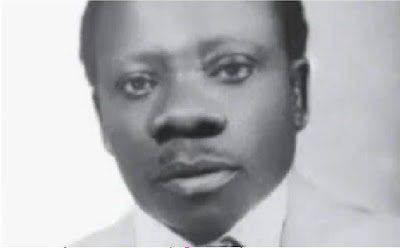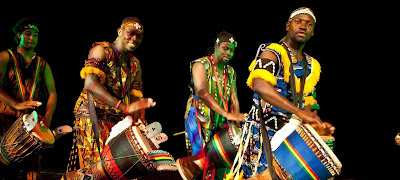The message of Ngugi Wa Thiong'o and Obiajunwa Wali on African literature
- Get link
- X
- Other Apps
The message of Ngugi Wa Thiong'o and Obiajunwa Wali on African literature
Ngugi Wa Thiong'o and Obiajunwa Wali were the only two Africans that really believed in African literature- others are in it for money and fame
Hello brothers and sisters
I've always wondered the simplest way to explain to Africans the message that Ngugi Wa Thiong'o and Obiajunwa Wali had for us on African literature. I think I've finally solved it, and in today's article I'll explain their message in a simple way that anybody can understand.
Let's get started!
A day before the news of the departure (not death) of our brother Ngugi Wa Thiong'o broke out, I was listening to the songs of various female African musicians across the African continent.
I listened to the songs of musician, Monique Seka, who's from Ivory Coast. The songs I listened to was "Missounwa." Here is it
After that, I listened to her other song "Okaman." Here is it
Then, I moved to Mali and listened to the song of Kamaldine, titled "Naderabi." Here's it
I moved to Congo and listened to the song of Mbila Bell, titled "Bo ya ye." Here is it
Again, in Congo, I listened to the song of Makoma, titled "Butu na moyi." Here's it
Still in Congo, I listened to the song of Barbara Kanam, titled "Bina malembe." Here's it
Then I moved to South Africa and listened to the song of Zahara, titled "Loliwe." Here is it
And that of another female South African musician named Brenda Fassie, titled "Vulindlela." Here's it
I branched in Benin Republic and listened to the song of Angelique Kidjo, titled "Agolo." Here's it
In Nigeria, I listened to the song of Onyeka Onwenu, titled "Ekwe." Here's it
I listened to more songs by other female musicians around the African continent.
If you're familiar with the songs of the said musicians, you'll notice that all the mentioned songs I listened to are the ones done in their various native languages. And that's what got me so inspired that I decided to write this article in honor of Ngugi Wa Thiong'o and Obiajunwa Wali.
Somewhere along the line as I sat listening to the songs, I began to cry, I felt so ecstatic of the voices that I began to shed tears. I mean, the said songs are world class and they are made in African languages.
They're so good that I began to shed tears in ecstasy, knowing that they are product of African languages.
You may wonder what I was thinking while listening to the songs that got me so ecstatic that I was shedding tears.
It wasn't just the songs alone that got me shedding tears, neither was I thinking about music in Africa. No, I was instead thinking about African literature, African languages, Obiajunwa Wali, Ngugi Wa Thiong'o.
While listening to the songs, I was asking myself; imagine during the colonization of Africa that Europeans imposed their languages on us as the only language to be used to sing all songs in Africa. It means these songs won't have been heard in African languages.
I was thinking; see how beautiful African languages are in songs. Literature is an art just like music, therefore, African languages would be this good too for writing.
I was thinking; but we have lost this type of creativity inspired by our native language in another type of art called literature.
I was thinking; who knows what books and other literary works that we would have produced in our native languages across Africa?
I was thinking; who knows what literary stars and authors would have emerged from native African languages?
I was thinking; this voices were not imported from Europe or America. They're completely a product of the ingenuity of African culture and people, and can compete toe-to-toe with any other singing voice anywhere on planet earth.
I was thinking; this is what Obiajunwa Wali and Ngugi Wa Thiong'o stood for in literature. They advocated till death that literature in Africa should be done in African language.
Those are the type of thoughts that were running through my mind, leading me to shed tears.
The next day, the first news headline I saw was the passing of Ngugi Wa Thiong'o. I immediately remembered what happened a day before and realized I was actually in a telepathic communication with him while listening to the songs. That's probably when he departed and he was thinking the same thoughts as mine till he departed. Ngugi departed thinking about African languages.
Send, Receive, and Withdraw money from Paypal, no matter your country
Most Africans haven't heard about Obiajunwa Wali in African literature. Wali was the most enlightened post colonial African personality in literature. The only reason you probably haven't heard about him is because he was sidelined by white people as he strongly believed that African literature should be written in an African language.
He died under mysterious circumstances in the hands of hired killers. His killers have never been caught till today. I believe he was assassinated by the British secret service.
Africans don't understand what Obiajunwa Wali and Ngugi Wa Thiong'o represented for African literature.
The reason the name of Obiajunwa Wali is suppressed in African literature is because if you know him, you'll understand that the reason we write in European languages in Africa is because we were cheated out of our native language and that Obiajunwa Wali and Ngugi Wa Thiong'o were against it throughout their lifetime.
Both of them are late now but I want to help keep their message going because they stood for the right thing. Their message must be kept alive until the right thing is done by future generation of Africans.
Their message was that we Africans must study, speak and write in our own language. We may then translate our books to English and any other language we want. That's the right thing to do, and until we do that, we can't truly call ourselves a free people.
The destruction of our native languages is the worst thing that happened to the African continent after slavery. That's why as a victim of that, I write in English now instead of expressing myself in an African language. For more information, read my book: intellectual slavery, the worst legacy of colonialism. Read the PDF version only. It's free. That's where you'll find all the details.
If you follow this blog and you've already read the said book or you read it later, you'll notice where I said that Europeans would lobby African elites to continue using European languages in Africa any day we want to shift attention to our native languages.
As at the time I wrote the book in 2017, I thought what I just said above was a prophecy. I didn't know it wasn't a prophecy! I didn't know it already happened!!
What happened was that after colonialism ended, some intelligent African authors started calling for African languages to be used in literature.
Sadly, Britain and the CIA sabotaged their effort, they killed the revolution for native African languages in literature and returned us back to writing in European language.
They achieved this by using the CIA to deceive some young post-colonial African authors like Wole Soyinka, Chinua Achebe, Christopher Okigbo, Ezekiel Mphalele, and Co. They deliberately misled them by training them in such a way that they despised African languages in literature. For more information, see how Britain and the CIA fooled Wole Soyinka and Chinua Achebe to destroy African languages in literature.
This is a major event that every African should know. However, in the said book, I didn't talk about it since I didn't have the details at that time.
Right now, I am working on another book to explain the post colonial lobbying and how Britain and the CIA destroyed African languages in literature.
My preliminary finding looks like what happened in a movie! It was a thoroughly thought out plot by the CIA and the colonialists that involved deep indoctrination, strong delusion, coercion, deceit, psychological manipulation, deep undercover work, and things of that nature.










Comments
Post a Comment